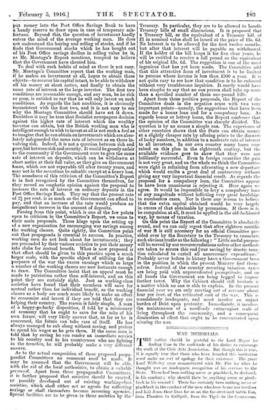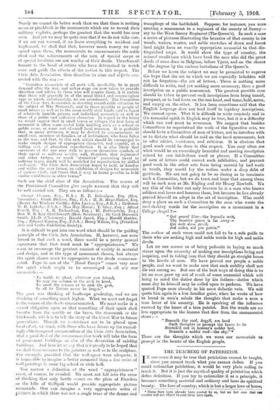wr A f t MEMORIALS.
E nation should be grateful to the Lord Mayer for finding time in the multitude of his duties to encourage the work of the Civic Arts Association. But though this is true, it is equally true that those who haye founded this institution need make no sort of apology for their existence. The great Lord Wellesley- once remonstrated with Mr. Pitt. for what ho thought was. an inadequate recognition of his services to. the State. There had been nothing mean or pinchbeck, he declared, in his conduct ; why should there be anything mean or pinch. beck in his reward ? There has certainly been nothing mean or pinchbeck in the conduct of the men who have borne our but-delis and laid down their lives for us on the ler-stretched battle line, from Flanders to Gallipoli, from the Tigris to the Cameroon». Surely we cannot do better work than see that there is nothing mean or pinchbeck in the monuments which are to record their military exploits, perhaps the greatest that the world has over seen. And yet we may be quite sure that if we do not take care, if we are not warned, if we leave everything to accident and haphazard, wp shall find that, however much money we may spend upon them, the monuments to commemorate the noble dead and the achievements of the men of special corps or of special localities are not worthy of their deeds. Therefore all honour to the band of artists who have determined to watch over and guide the efforts of the nation in this respect. The Civic Arts Association thus describes its aims and objects con- nected with the war :- " Countless memorials of all sorts will, inevitably, be in great demand after the war, and unless steps are now taken to provide direction and advice to those who will require them, it is certain - that these will generally be of the usual trivial and commonplace type to which, unfortunately, we are accustomed. Tho Committee of the Civic Arts Association is devoting considerable attention to the subject of War Memorials, and to those possible to people of small means as well as to the more costly civic kinds, and to forms of relatively humble private and individual memorials as well as those of a public and collective character. In regard to the latter we would suggest that in small towns or villages the best form of memorial is often some useful little building such as a school or public room, or some sort of.small local museum. It is probable that, in many instances, it may be desired to commemorate, at small cost, members of families, or of institutions, who have fallen in the war, and that, to this end, artists should be encouraged to
• make simple designs of appropriate character, and capable, at a
. trilling cost, of abundant reproduction. It is also .likely that survivors of the war may wish to possess decorative symbols of their naval or military service, and, therefore, that regimental and other badges, or small `statuettes' presenting naval or military types, might well be modelled for reproduction by skilled craftsmen. The Civic Arts Association hopes to held, in London and within the near future, an exhibition of designs for memorials of Various finds, and trusts that it may be found possible to hold similar exhibitions in othertowns."
Such are the chief aims of the Association. The names of the Provisional Committee give ample warrant that they will he well carried out. They are as follows :— Ceorge Cisesen Esq., R.A. ; E. R. Debenham, Esq. (Hon. Treasurer); Frank Dieksee, Esq.; R.A. ; H. R, Hope-Pinker, Esq.
(Master Art il'orkers' Guild); John Lavery, Esq., ; Professor W. R. Lethaby, F.S.A. ; Miss May Morris ; T. Okcy, Esq.; Alfred Powell. Esq. ; A. E. Richardson, Esq.; W. Rothenstein, Esq.; Hon R. R. Kay-Shutticworth (Hon. Secretary); Sir Cecil Harcourt Smith, LL.D. (Chairman); Harold Speed, Esq.; Harold Stabler, Esq. ; Edward Warren, Esq., P.S.A. ; Henry Wilson, Esq. (President Arts and Crafts Exhibition Society).
It is difficult to put into one word what should be the guiding principle of the Civic Arts Association. If, however, one were forced to find such a word, there would be a pretty general agreement that that word must be " appropriateness." We want to encourage the greatest amount of variety in material and design, and in the typo of monument chosen, but always the spirit shown must be appropriate to the deeds commemo- ated. rope in one of the "Moral Essays " comes very near the spirit ,Whiels ought to be encouraged in all our war , rernoriala:--
" " To build, to plant, whatever you intend,
To rear the column or the arch to bend,
To swell the terrace or to sink the grot, In all let Nature never be forgot."
The poet was thinking of landscape gardening, and we are thinking of something much higher. What we must not forget is the nature of the deeds commemorated. We must make it a .. seem] obligation- upon us that something of their spirit shall
• breathe from the marble or the brass, the stonework or the brickwork, which is to tell the story of. the Great. War to fame generations. Though no restrictions are to be placed upon - local effort, we trust, with those who have drawn up the exceed- ' ingly able inaugural memorandum of the Civic Arts Association, that a good deal of the commemorative work will take the form ,f permanent buildings or else of the decoration of existing buildings. And here let us- say that it is greatly to be hoped that • we shall have recourse to the painters as well as to the sculptors. _For example, provided that the wall-space were adequate, it is impossible to imagine a better memorial than a fine series of wall-paintings in some big school or civic hall.
T. . • • - oo narrow a definition of the word " appropriateness " must, of course, be avoided. We must not fall into the error of thinking• that only battle scenes on the plain of Flanders or tho hills of Gallipoli would provide appropriate picture.
One can*. imagine a very appropriate series of Petures in which there was not a single trace of the drums and
tramplings of the battlefield. Suppose, for instance, you were - erecting a monument to a regiment of the 'county of Surrey— say to the West Surrey Regiment (The Queen's). In such a case a series of pictures illustrating the beauties of that county in its
woods, waters, wastes, and noble stretches of down and forest land might form an exactly appropriate memorial to that dis- tinguished corps. It would show the type of country, the natural conditions which have bred the men who did the great deeds of arms clone in Belgium, before Ypres, and on the. shores of the Aegean by the various battalions of The Queen's.
Before we leave the subject we may be permitted to express the hope that the art to which wo are especially beholden will not be forgotten—the art of letters. ' There is nothing more
difficult to write, and yet nothing more necessary, than a good inscription on a public monument. The greatest possible care should be taken to prevent such inscriptions from being tumid, pompous, or in bad taste on the one hand, and tame, bald, mean, and empty on the other. It has beck sometimes said that the English language does not lend itself to lapidary inscriptions. We cannot agree. That it is difficult to write concisely and in the memorial spirit in English may be true, but it is a difficulty which can and must be overcome. We suggest that besides • Committees to superintend the work of the figurative arts, we should have a Committee of men of letters, not to interfere with or to dictate what should be said on the local monuments, but to offer advice, assistance, and criticism. It is obvious that good work could be done in this respect. You may often see
what would be art exceedingly beautiful and moving inscription ruined by one infelicitous word or phrase. If a Committee of men of letters could correct such infelicities, and prevent good work in the other arts from being marred by bad work in words, they would lay the nation under a deep debt of
gratitude. We are not going to be so daring as to nominate such a Committee, but we do trust and hope that among them will be such men as Mr. Kipling and Sir Henry Newbolt. . We say this of the latter not only because he is a man who knows soldiers and loves and honours them, but because he has already proved himself an adept in the art of inscription. Who could deny a place on such a Committee to the man who wrote the
soul-shaking words for the inscription on a monument in a College chapel ?— ." Qui procul Itinc—the legend's writ, The frontier grave is far away- - Qui ante diem peritt,
• Sid Miles, sod pro patria."
The author of such verse could not fail to be a safe guide to thoSe who are seeking high and noble words for high and noble deeds;
Let no one accuse us of being pedantic in laying so much stress upon the necessity of making our inscriptions living and inspiring, and in taking care that they should go straight home
to the hearts of men. We have proved our people a noble people, and we want to make sure that such nobility shall not die out among us. But one of the best ways of doing this is to let no man grow up out of reach of some memorial which will bring to mind the duties done by his fathers—duties which
some day ho himself may be called upon to perform. We have quoted Popo once already in his most didactic vein. We will quote him again in a less familiar guise, when he wrote of how
to breed in men's minds the thoughts that make a man a true lover of his country. He is speaking of the influence exerted by the home of a true patriot. But the words are no less appropriate to the lessons that flow from the monumental stone :—
" Beneath thy roof, Argyll, are bred
Such thoughts as prompt the brave to lie
Stretch'd out in honour's nobler bed, Beneath a nobler roof—the sky."* Those are the thoughts which we want our memorials to prompt in the hearts of the English people.



































 Previous page
Previous page